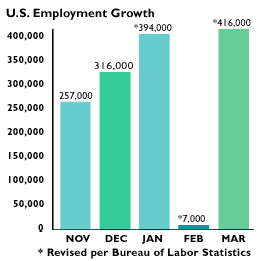|
Train workers: Greenspan
|
 |
April 11, 2000: 12:52 p.m. ET
Need to properly train U.S. workers to ensure new economy jobs get filled
|
NEW YORK (CNNfn) - Companies and government have to work together to ensure that workers get the education and training they need to obtain "new economy" jobs, and to keep the United States at the forefront of advances in technology, Federal Reserve Chairman Alan Greenspan said Tuesday.
In prepared remarks before the U.S. Department of Labor's National Skills Summit in Washington, D.C., Greenspan said that advances in information technology and their incorporation into the daily workings of the economy have reduced the number of hours American workers have to sweat it out to produce goods and services - boosting productivity in the process.
At the same time, the Fed chief warned that the government, along with universities and corporations, need to keep on top of training workers for skilled positions to keep the U.S. as a nation competitive in the new world of developing technologies.
"Certainly, if we are to remain preeminent in transforming knowledge into economic value, the U.S. system of higher education must remain the world's leader in generating scientific and technological breakthroughs and in preparing workers to meet the evolving demands for skilled labor," he said.
Boost programs, spending
Greenspan noted that "the pressure to enlarge the pool of skilled workers also requires that we strengthen the significant contributions of other types of training and educational programs, especially for those with lesser skills."
 His remarks came less than a week after the Labor Department reported a surge in new job creation, even as a host of one-time factors boosted new hires among businesses and government. The economy added 416,000 new jobs in March, while the unemployment rate held steady at 4.1 percent. His remarks came less than a week after the Labor Department reported a surge in new job creation, even as a host of one-time factors boosted new hires among businesses and government. The economy added 416,000 new jobs in March, while the unemployment rate held steady at 4.1 percent.
"The demand for new computer applications will no doubt continue to spur demand for those with the creativity and the higher-level conceptual skills that will enable us to increasingly harness technology to produce greater economic value," Greenspan said.
"Perhaps more intriguing are those as yet unrealized opportunities for computers and information technology to further improve the accuracy of medical diagnoses and to complete the mapping of the human genome, or still unimagined opportunities for expanding our scientific knowledge more generally," he said.
Mum on stocks, rates
Greenspan made no specific mention about the current pace of the U.S. economy, the turbulent stock market or the direction of short-term interest rates. Most analysts on Wall Street are anticipating another quarter-point rate increase from the Fed next month.
He did laud the "vibrant" U.S. economy - for which he mainly credited technological innovation - and pointed out that other regions of the world, namely Europe and Japan, have not made as much progress at passing those technological gains on to their respective labor forces because of inflexible and costly hiring and firing policies.
U.S. Labor Secretary Alexis Herman last week said she was pleased with the pace of job creation, though concerned about the lack of available training to help American workers acquire more skilled positions, something she thinks would narrow the gap between Americans available to work and the host of skilled positions employers are clamoring to fill.
That's why the Labor Department is hosting today's one-day National Skills Summit on how to improve training for workers. Herman is also one of the keynote speakers at the summit, which is taking place at Howard University in Washington. 
|
|
|
|
|
 |

|

